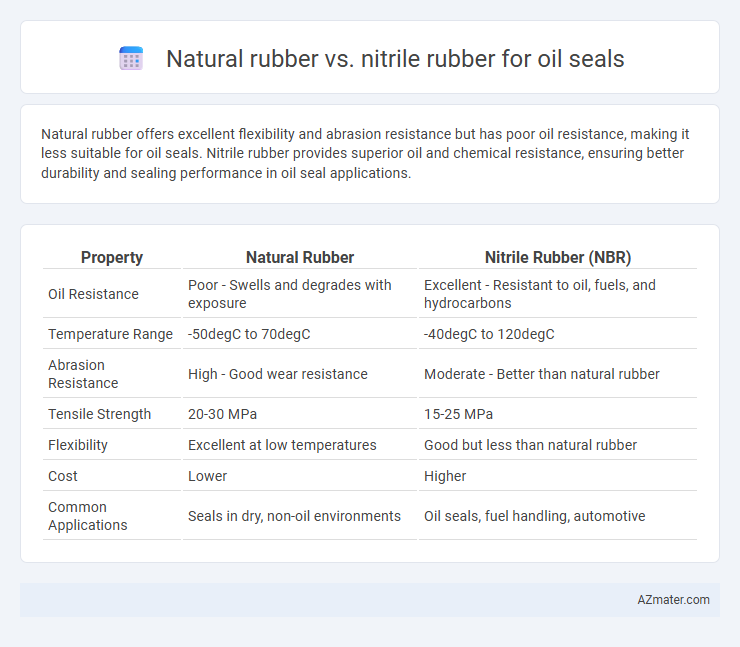Natural rubber offers excellent flexibility and abrasion resistance but has poor oil resistance, making it less suitable for oil seals. Nitrile rubber provides superior oil and chemical resistance, ensuring better durability and sealing performance in oil seal applications.
Table of Comparison
| Property | Natural Rubber | Nitrile Rubber (NBR) |
|---|---|---|
| Oil Resistance | Poor - Swells and degrades with exposure | Excellent - Resistant to oil, fuels, and hydrocarbons |
| Temperature Range | -50degC to 70degC | -40degC to 120degC |
| Abrasion Resistance | High - Good wear resistance | Moderate - Better than natural rubber |
| Tensile Strength | 20-30 MPa | 15-25 MPa |
| Flexibility | Excellent at low temperatures | Good but less than natural rubber |
| Cost | Lower | Higher |
| Common Applications | Seals in dry, non-oil environments | Oil seals, fuel handling, automotive |
Introduction to Oil Seals: Purpose and Importance
Oil seals, essential components in mechanical systems, prevent lubricant leakage and block contaminants from entering machinery. Natural rubber offers excellent elasticity and resilience, making it suitable for low-temperature environments and moderate oil exposure. Nitrile rubber, known for its superior resistance to oils, fuels, and high temperatures, provides enhanced durability and sealing performance in harsh industrial applications.
Overview of Natural Rubber: Properties and Uses
Natural rubber offers excellent elasticity, high tensile strength, and superior abrasion resistance, making it ideal for oil seals in applications requiring flexibility and durability. Its inherent resilience provides effective sealing against water, air, and certain chemicals, though it is less resistant to oils and petroleum-based fluids compared to nitrile rubber. Commonly used in automotive and industrial oil seals, natural rubber performs well in environments with moderate temperature and non-aggressive fluids.
Overview of Nitrile Rubber (NBR): Properties and Uses
Nitrile Rubber (NBR) offers superior resistance to oils, fuels, and chemicals, making it an ideal material for oil seal applications where natural rubber (NR) falls short due to its lower oil resistance. NBR exhibits excellent abrasion resistance, good tensile strength, and a broad temperature range from -40degC to 120degC, enhancing seal durability in harsh environments. Commonly used in the automotive and industrial sectors, nitrile oil seals ensure reliable performance in hydraulic systems and machinery exposed to petroleum-based fluids.
Oil Resistance: Natural Rubber vs Nitrile Rubber
Nitrile rubber (NBR) offers superior oil resistance compared to natural rubber, making it the preferred material for oil seals in automotive and industrial applications. Natural rubber tends to degrade and swell when exposed to oils, leading to reduced sealing efficiency and shorter service life. In contrast, nitrile rubber maintains its tensile strength and flexibility even after prolonged contact with petroleum-based oils, ensuring reliable sealing performance.
Temperature Tolerance: Comparative Analysis
Natural rubber oil seals withstand temperatures ranging from -40degC to 100degC, making them suitable for moderate temperature applications. Nitrile rubber oil seals offer a broader temperature tolerance, typically from -40degC up to 120degC, providing enhanced resistance to heat and oil exposure. This higher thermal stability of nitrile rubber ensures durability and performance in more demanding environments involving elevated temperatures.
Chemical Compatibility with Various Oils
Natural rubber offers excellent elasticity and resilience but has limited chemical compatibility, particularly degrading when exposed to petroleum-based oils and synthetic oils. Nitrile rubber exhibits superior chemical resistance to a broad range of oils, including mineral oils, gasoline, and many hydraulic fluids, making it the preferred choice for oil seals in automotive and industrial applications. Its molecular structure provides enhanced resistance to swelling and breakdown in contact with hydrocarbons, ensuring longer seal life and improved performance.
Durability and Lifespan in Oil Seal Applications
Natural rubber offers excellent elasticity and resilience but tends to degrade faster in oil seal applications due to poor oil resistance and susceptibility to oxidation. Nitrile rubber (NBR) exhibits superior durability and a longer lifespan in oil seals, maintaining flexibility and sealing performance under prolonged exposure to oils, fuels, and heat. The enhanced resistance of nitrile rubber to petroleum-based fluids significantly extends oil seal service life in automotive and industrial environments.
Cost and Availability of Materials
Natural rubber offers lower raw material costs and widespread availability due to its renewable sourcing from rubber trees, making it a cost-effective choice for oil seals in standard applications. Nitrile rubber, synthesized from acrylonitrile and butadiene, generally has higher raw material costs and relies on petrochemical sources, which can impact price stability and availability. However, nitrile's enhanced oil resistance may justify its cost premium despite more variable supply chains compared to natural rubber.
Environmental Impact and Sustainability
Natural rubber, derived from renewable latex sap of Hevea brasiliensis trees, offers significant environmental benefits due to its biodegradability and carbon sequestration during tree growth. Nitrile rubber, a synthetic polymer produced from petroleum-based acrylonitrile and butadiene, poses challenges in sustainability because of its reliance on non-renewable fossil fuels and limited biodegradability. Choosing natural rubber for oil seals supports lower environmental impact and enhanced sustainability through reduced greenhouse gas emissions and improved end-of-life decomposition.
Choosing the Right Rubber for Oil Seals: Key Considerations
When selecting rubber for oil seals, natural rubber offers excellent elasticity and tensile strength but has poor oil resistance, making it less suitable for high-temperature or petroleum-based applications. Nitrile rubber (NBR) provides superior resistance to oils, fuels, and synthetic fluids, with good mechanical properties and temperature tolerance up to 100degC, making it a preferred choice for automotive and industrial oil seals. Key considerations include chemical compatibility, temperature range, and wear resistance to ensure optimal seal performance and longevity.

Infographic: Natural rubber vs Nitrile rubber for Oil seal
 azmater.com
azmater.com